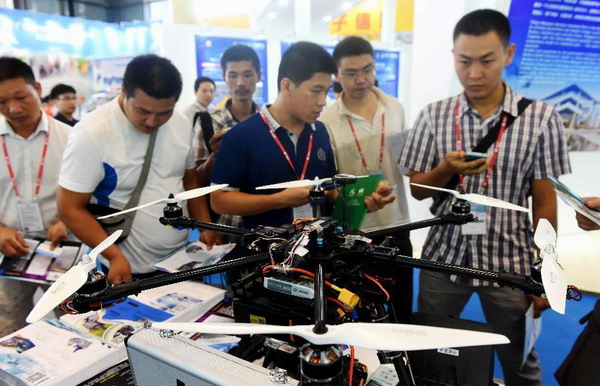China, ASEAN plans synergize
By Kheng Swe Lim (China Daily) Updated: 2015-03-28 09:06
|
 |
|
Visitors look at a six-axis unmanned aircraft displayed during the 11th China-ASEAN Expo in Nanning, capital of South China's Guangxi Zhuang autonomous region, Sept 16, 2014. More than 200 technological products by over 100 producers were on display at the expo. [Photo/Xinhua] |
The Association of Southeast Asian Nations' engagement with China runs deep. The two sides signed the China-ASEAN Free Trade Agreement (CAFTA) in 2002, which helped increase Sino-ASEAN trade from $78 billion in 2003 to $480 billion in 2014. Also, China is a major investor in and aid donor to several ASEAN member states, particularly Laos and Cambodia.
For ASEAN, therefore, China is an old, familiar economic partner. And China can use this base to engage ASEAN as a partner in the Silk Road Economic Belt and 21st Century Maritime Silk Road initiatives.
China's "Belt and Road Initiatives" can be of great interest to the ASEAN members, because they have the potential to reshape the geo-economic landscape of the region. Over the coming months and years, ASEAN will watch closely how the initiatives progress.
There is a simple economic logic behind China's plans and Southeast Asian economies' needs. ASEAN economies are seeking sources of capital, and China is looking to use the capital at its disposal to build the new Silk Roads.
China has a deep pool of capital that it can invest in ASEAN economies, and Southeast Asian countries have been looking for new sources of investment to boost their economic growth. For example, Indonesia, the economic giant of Southeast Asia, is looking for $6 billion in investments to expand its ports, and China can provide the bulk of its need. Besides, Malaysia is cooperating with China over a $3.4-billion industrial park in the port town of Kuantan.
- Agenda of China-ASEAN Information Harbor Forum
- Chinese economy shows 'strong fundamentals', says ex-Australia PM
- Experts optimistic about China's economic outlook
- 'Trade initiatives helping globalization'
- Manzhouli's opening-up efforts starting to bear fruit
- 'Appetite' in China still strong: Coca-Cola
- Oaktree on the hunt for more distressed assets
- SME fund to invest only in early stage startups
















